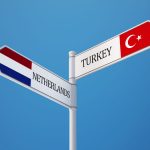Given Ankara’s long-running support for armed groups in Syria, it’s not unnatural that a funeral ceremony for a commander of one of those groups be held in Turkey. Abdel Baset al-Sarout, 27, a commander in Jaysh al-Izza who became a media icon, was taken to a hospital in Reyhanli in Hatay province on June 8. Sarout soon succumbed to his injuries, and a crowded funeral ceremony took place at Tevhid Mosque in Reyhanli the following day, before his body was sent to Syria for burial.
Turkish hospitals in border provinces like Hatay, Kilis and Gaziantep have treated many rebels wounded on Syrian battlefields, including members of the Islamic State (IS). The benevolence of the Turkish state had only stirred limited criticism thus far, as many see the government’s actions as standing by the oppressed.
Yet holding a ceremony for a man who once called for the extermination of Alawites touched a sore spot for many in Hatay, a region where various ethnic and religious groups coexist peacefully, including ethnic Arabs of the Alawite faith.
At a 2012 opposition rally, Sarout chanted, “We are all jihadis. Homs has made its decision. We will exterminate the Alawites. And the Shiites have to go.” Sarout was controversial for his links to IS and Jabhat al-Nusra. Albeit the media praised him as a “hero” and “the singer of the revolution” for his anti-regime songs and as “the guard of the revolution” in reference to his past role as a goalkeeper in Homs.
Naturally, those disturbed by the funeral in Turkey remembered Sarout’s questionable record. Sarout was reported to have pledged allegiance to IS in 2014. Two years later, Sarout explained that, as he left Homs, he was a part of a large group that intended to pledge their allegiance to IS and Abu Daoud of the Ahl Sunnat wal Jamaat group. Sarout said his pledge became void, however, as it turned out Abu Daoud did not have the authority to accept such a pledge. Sarout also said that Jabhat al-Nusra imprisoned him for his affiliation with IS, later acquitting him during a Sharia trial.
Sarout said IS and Jabhat al-Nusra shared the same objectives and would fight together, shoulder to shoulder, against Shiites and Christians. Sarout ended up with Jaysh al-Izza, and, despite occasional problems, the group collaborated with Hayat Tahrir al-Sham (HTS), the successor of Jabhat al-Nusra, in the Hama countryside. (Jaysh al-Izza was also a recipient of missiles under the CIA’s secret Timber Sycamore program.) Since early May, the situation in the Hama countryside escalated. Jaysh al-Izza commander Jamil al-Saleh attended a meetingcalled in late May by HTS leader Abu Mohammed al-Golani in a bid to forge unity among various factions.
Sarout’s record should not be much of a problem for the Turkish government, which supplies weapons and ammunition to factions fighting alongside HTS in Idlib. Indeed, the report on Sarout’s death by Turkey’s official Anadolu news agency was titled “Syrian revolution hero martyred after Hama clashes” and referred to him as a “revolution icon.”
Still, pro-government media outlets offered modest coverage of the funeral ceremony in Reyhanli, wary, it seems, of fueling indignation over the event, which was awash in Free Syrian Army flags and chants in Arabic. Reyhanli’s top public administrator, Fatih Cobanoglu, tweeted that “the funeral [prayers] for a commander of the Syrian opposition turned into an unauthorized demonstration in the form of a convoy with flags and chants.” He slammed this as “unacceptable and irresponsible behavior,” and cautioned that “such actions open to provocations will not be allowed.” However, the message was later deleted after reactions from quarters sympathizing with Syrian rebels.
The funeral ceremony reverberated on social media and the controversy even reached the Turkish parliament. Baris Atay, a Hatay deputy for the Workers Party of Turkey, submitted a parliamentary question to Interior Minister Suleyman Soylu, asking why the authorities allowed “the organization of a funeral that turned into a provocative demonstration.”
Tulay Hatimogullari, a lawmaker for the pro-Kurdish Peoples’ Democratic Party, described organized participation in the event, with buses ferrying people both locally and from Syria. She asked whether the authorities had launched a probe into the organizers. “When a funeral ceremony is turned into a Salafi demonstration and then a blind eye is turned to that, this amounts to disregarding the peoples’ sensibility on coexistence and egging on the IS project for an Islamic state,” the lawmaker said. She charged that Reyhanli remained a base for such radical groups.
Serkan Topal, a Hatay deputy for the main opposition Republican People’s Party, drew attention to the delicate ethnic and religious fabric of the region, stressing that “such provocative behavior in Reyhanli amounts to dynamiting unity in Hatay.”
The provision of funeral services by the local municipality further fueled the controversy. A witness from Reyhanli told Al-Monitor, “The municipality has been providing various services to [rebels from Syria], including the allocation of funeral vehicles for Syrians who die in hospitals here after being brought on ambulances from the border. The bodies are being driven to the border. In the incident in question, the standard practice was applied.”
The witness described the demonstrators as “mostly Syrians. I did not observe any active participation [by locals] from Reyhanli.”
Of note, funeral prayers in absentia were held for Sarout at the Fatih Mosque in Istanbul as well.
Reyhanli, the scene of twin car bombings in 2013 that claimed 53 lives, remains a highly sensitive place. The district has a population of 98,000 people and hosts about 115,000 Syrian refugees.
Sarout and the controversy over his funeral ceremony in Reyhanli are, in fact, another illustration of Turkey’s impasse in Syria. The factions that Ankara backs are often intertwined with al-Qaeda-linked groups on the Syrian battlefield. President Recep Tayyip Erdogan has vouched for such groups, calling them “the Syrian National Army” and even comparing them to Turkish groups that fought occupying Allied forces after World War I. Jaysh al-Izza is an example of the blurry line between “moderates” and “radicals.” And the stories of fighters like Sarout, who have earned adulation thanks to Erdogan’s policies, show how “moderate” rebels are incoherently classified.
By Fehim Tastekin
Source: Al-Monitor



